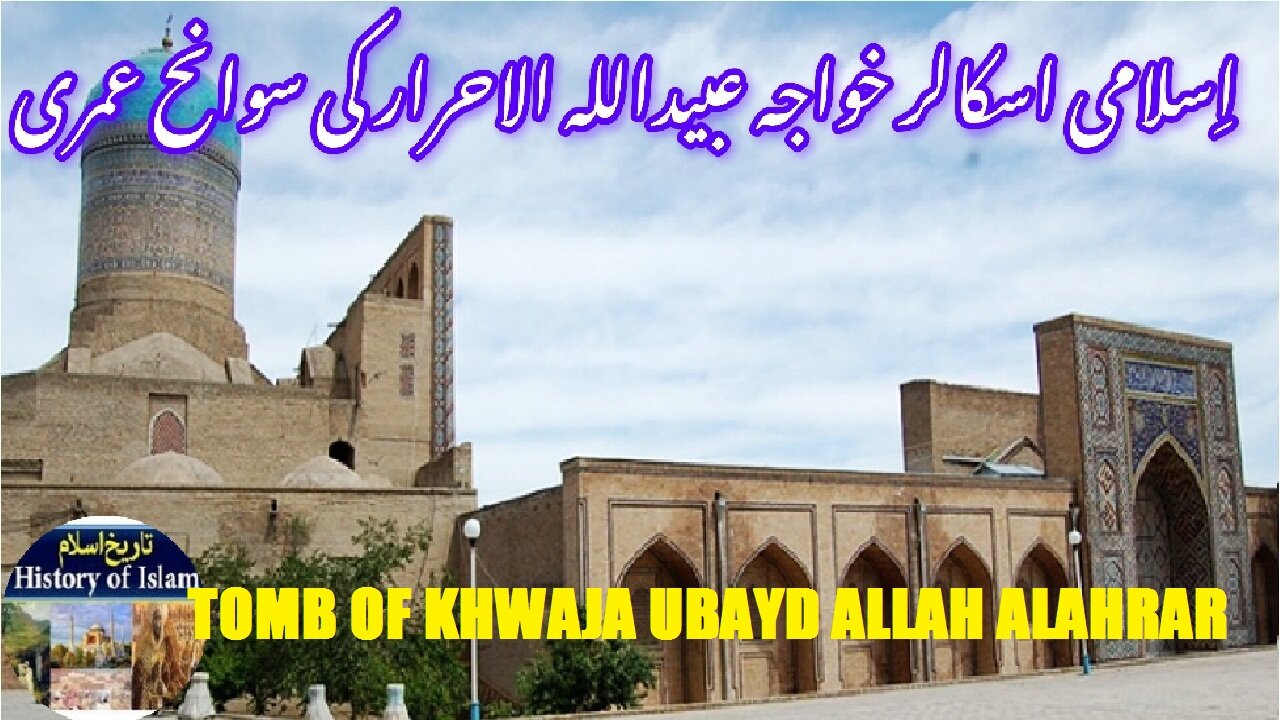Premium Only Content

Biography of Khwaja Ubayd Allah al-Ahrar and tomb | خواجہ عبید اللہ الاحرار کی سوانح حیات اور مقبرہ
@islamichistory813 #Biography #SufiPhilosophy #SpiritualWisdom
Biography of Scholar Khwaja Ubayd Allah al-Ahrar and tomb
Dekhti Aankhooon aur sountay kaanoon ko Asslamoalaikum, In this islamic informative video, we presenting the biography of Khwaja Nasir ad-Din Ubayd Allah al-Ahrar, a revered spiritual scholar known for his deep understanding of Sufi philosophy. Get to know the key events of his life, his teachings, and the impact he had on spiritual communities. This exploration offers a glimpse into the wisdom and guidance that continue to inspire seekers of truth today.
Khwaja Nasir ad-Din Ubayd Allah al-Ahrar (may God sanctify his innermost being) is the twentieth Shaykh in the Naqshbandi Golden Chain and at the same time, the eleventh Khwaja of the ‘Khwajagan’ – the Masters of Wisdom of Central Asia. He was known to many throughout Central Asia as the ‘Prince of Turkestan’, due to his spiritual pedigree.
He was born in the village of Saghistan, Bustanlik district, in the Shash district, known today as Tashkent, Uzbekistan. He was born in 1404 AD, one year before the death of Timur (Tamerlane), who was succeeded by his son, Sultan Shahrukh. Khwaja Ubayd Allah spiritually dominated Central Asia for the greater part of the fifteenth century, and all historians agree that his influence was paramount. He met many Shaykhs and sages during his lifetime, including the renowned Naqshbandi Shaykh, Abdul Rahman Jami, who subsequently wrote very favourably about the Khwaja.
Khwaja Ubayd Allah’s geneology goes back to the Caliph, Umar ibn al-Khattab. His father, Muhammad Shahsi, was a Sufi. His grandfather, Mawlana Shihabuddin Shashi, was a Sufi Shaykh, who is said to have been a wise and learned Shaykh, endowed with spiritual states and charismatic powers. When Shaykh Shihabuddin was near to death, the infant Khwaja was brought to him, wrapped in a cloak. The Shaykh became excited and said, “This is the child I wanted. May this child soon bring honour to this world, currency to the sacred law and lustre to the Sufi path.”
When he reached the age of twenty two, his maternal uncle Shaykh Ibrahim Shashi took the young Khwaja Ubayd Allah from Tashkent to be educated in Samarqand where he spent, due to his passionate interest in inner wisdom and mysticism, all his time attending the meetings of the Sufis of Samarqand, including those of Mawlana Said al-Din Kashghari. After spending two years in Samarqand, at the age of twenty four he travelled to Herat, by way of Bukhara and Merv, to study there for five years. During this time in Herat, he was continually with Sufi Shaykhs, including travelling to the principle centres of Turkestan.
According to his own account, “Until I was twenty nine years of age, I was a pilgrim. Five years before the plague year, I returned to Tashkent.” It was then that he became interested in agriculture. Following an inner vision that was given to him, he took a small piece of land and a pair of oxen provided by his family, and planted seed according to the indications he had received in his vision. From the start, his crops were amazing and he discovered the secret of finding the right crop for every type of land. The result of this was that many people developed their own land under his direction. Within a few years, he became one of the biggest farmers in Turkestan. He was responsible for introducing the system of cropping that made Turkestan the granary of Asia, for centuries. In regard to this, the Khwaja said, “God Almighty gave me such an extraordinary insight into the needs of plants and animals, that I can produce three, five, or even ten times more from the land than other farmers do.
Khwaja Ubayd Allah said, “After four years in Herat, I set out for Khuluftu, with the intention of seeking instruction from Khwaja Yaqub Charki.” Once he met Khwaja Yaqub, he recounted, “Khwaja Yaqub held out his hand and said. ‘The venerable Khwaja Bahauddin Naqshband took my hand in his and said, ‘Your hand is my hand – whoever holds your hand, has held my hand.’ This hand is the hand of Khwaja Bahauddin, so take hold of it.’ I immediately took his blessed hand in mine and he instructed me in the method of negation and affirmation through numerical awareness.
After three months in his company, Khwaja Yaqub gave me permission to leave. On the day of parting, he gave me a complete explanation of the Way of the Masters. He described the method of bonding heart to heart and said, ‘Go gently in the teaching in this path. You may guide capable seekers to their destination.”
Mawlana Qasim Tabrizi, whom Khwaja Ubayd Allah studied under in Herat said to him, “It is right that you attain the Reality of your name.” This is explained in the record of the Khwaja’s life as, ‘the true significance of being a servant of God, ‘Ubayd Allah’, is revealed only to those who have become worthy of knowing the reality of God’s will. In every age one single man reaches that level of perfection. He is called the ‘Qutb al-Aqtab’ – ‘Axis of the World’. When the Shaykh said that Khwaja Ubayd Allah was to ‘realise his name’, he signified that he was destined to become the Great Axis and the Highest Caliph on earth in his time.
He died in 1490 AD in the village of Kemangiran, which is now a suburb in the south east of Samarkand, where he established a large School and Mosque, which are still in use today. He left two sons, Shaykh Muhammad ibn Abdullah and Shaykh Muhammad Yahya, both of whom continued the teachings of their father. Khwaja Ubayd Allah passed the secret of the Naqshbandi Golden Chain to Khwaja Muhammad az-Zahid.
The Khwaja was survived by a large number of disciples from a variety of professional and social backgrounds. They ensured that the Naqshbandis continued their close relationships with the ruling dynasties, which included, Sultan Umar Shaykh Mirza who was the Khwaja’s close disciple and his son, Babur, who was also a life-long devotee of the Khwaja’s. The conquest of India by Babur in 1526 gave considerable impetus to the development of the Naqshbandiyya Order.
May God be well pleased with him.
So sisters brothers friends and elders, tomorow we will be described Biography of Abu Hmid Muhammad ibn Muhammad al-Tusiyy al-Ghazali. Allah hafiz
=============
-
 2:07:25
2:07:25
Steven Crowder
5 hours agoBREAKING: Russia Launches ICBM for First Time in History - What Happens Next?
378K189 -
 1:39:19
1:39:19
The Shannon Joy Show
5 hours ago🔥🔥While Americans Are Watching WWE Politics: Australia Is Ramping Up MANDATORY Digital ID🔥🔥
20.6K5 -
 2:03:36
2:03:36
LFA TV
15 hours agoTHE FIGHT IN ONLY BEGINNING! | LIVE FROM AMERICA 11.21.24 11am EST
46.7K24 -
 1:18:10
1:18:10
Graham Allen
6 hours agoPutin Vows Peace With Trump But WAR Under Biden!! + 400,000 Kids Are MISSING?!
116K218 -
 2:11:07
2:11:07
Matt Kohrs
14 hours agoMSTR Squeezes Higher, Bitcoin To $100k & Nvidia Post Earnings || The MK Show
56.9K1 -
 42:07
42:07
BonginoReport
7 hours agoNikki Haley's Hatred of Tulsi Gabbard Just Made Me a Bigger Fan (Ep.90) - 11/21/24
114K230 -
 28:41
28:41
Professor Nez
12 hours ago🚨BLOOD on their HANDS! The Man Biden & Kamala Flew In Finally Faces JUSTICE for Laken Riley
58K30 -
 1:06:27
1:06:27
2 MIKES LIVE
5 hours agoThe Mike Schwartz Show 11-21-2024
65.2K2 -
 15:07
15:07
PMG
14 hours ago $1.45 earned"President Trump's Cabinet is Amazing!"
66K -
 DVR
DVR
Vigilant News Network
17 hours agoHeavily-Vaxxed County Faces Grim Reality | The Daily Dose
54.5K20